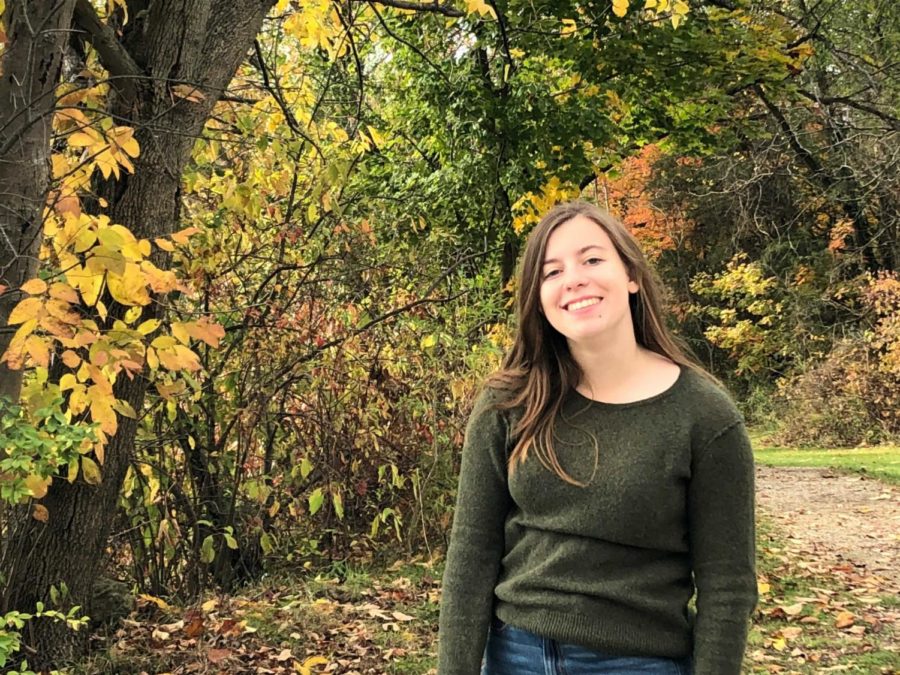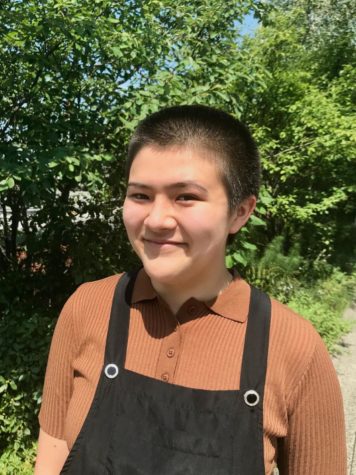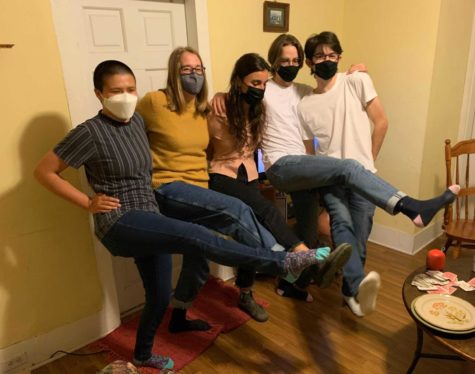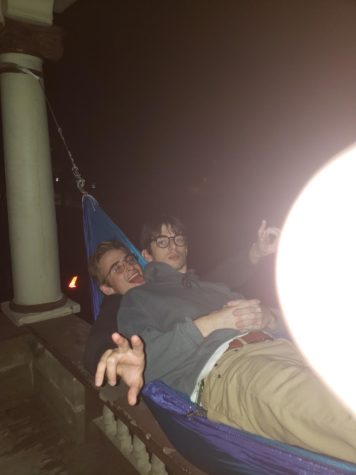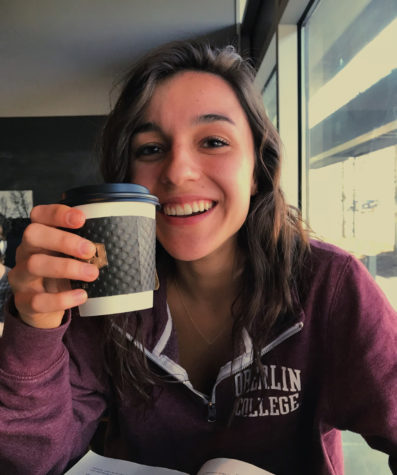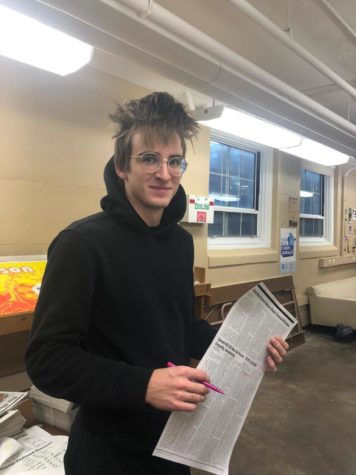Kate Fishman, OC ’21, Managing Editor
Kate Fishman was the Review’s Managing Editor beginning with our summer 2020 publication cycle to the end of the spring 2021 semester. As future managing editor, I interviewed Fishman about herself and her time in Oberlin with the Review.
This interview has been edited for length and clarity.
What brought you to the Review?
I started as a writer and I think I went to an interest meeting or something and it was in the little basement and I knew that I wanted to be writing. I think the first couple of weeks I wrote for News, Ops, and Arts, and I really quickly realized, “Okay, I’m just interested in Arts.” And so then I started pretty much every week just writing for arts, occasionally pitching stuff, but mostly just taking what I was interested in from the emails. I got to interview sam sax [OC ’09], which was cool. He was a poet. And I got to write about this film by an alum DJ Savarese called Deej, [OC ’17]. He was screening it here.
So I got to work on some stories that were really exciting to me. Then a former editor at the Review texted me about one of the Arts positions being open and was like, “Hey, you should definitely go for this if you, if you want to.” And I thought about it and I definitely wouldn’t have if she hadn’t done that, but I did. And I got the Arts Editor job and then stayed there for a couple of years and had a lot of fun. And then sort of a similar thing, at some point I was like, “I might be interested in managing.” Ananya [Gupta, OC ’20 ] and Nathan [Carpenter, OC ’20], both at different points said, “You should do that, and you should think about how to set yourself up to do that.” Which was cool.
Would you like to share some funny stories or treasured memories from the Review?
I really came to appreciate our office space a lot more [after our staff was relocated to Wilder Hall for COVID-19 safety measures]. Just how there’s a lot of history there. It’s a very lovely space. For people who haven’t been in the Review office, it’s covered in quotes from different staff members over the years that are just written on the walls in Sharpie. There are photos of staff members who have been section editors and senior staff and just contributed to the paper in different ways. And there are random gags that we’ve printed out to the point where like, I don’t know what half of them are reference to, but I recognize them ’cause they’re on the wall. I think that that is just a really special zone. And there’s a little couch in the corner that was always where Arts would sit over a certain period. Me and my co[-editor] would always be sitting there on that couch. I think Katherine [MacPhail] and I wrote on that couch for weeks and weeks, just kind of working on our stuff. There’s a lot of fun memories in that space.
So what are some accomplishments that you have made as managing editor?
I think being managing editor during COVID was really a wild ride just in terms of feeling like… I don’t know, we had all these plans and they were sort of constantly shifting. Over the summer we were asking ourselves, “Okay, how are we going to print? What’s going to happen?” And we were making all our plans around that and then [the administration] said, “You can’t print.” I think a lot more mental energy and time went toward dealing with that than we thought. I am really actually very proud that we did a summer publication cycle last year and that we kept publishing news and everything. To my knowledge summer publication had never happened before — and it was all remote. We have obviously a really amazing staff who were very dedicated during that time. Everybody also had other jobs and things going on, but we managed to put out some articles that I think were timely and were helpful for people — covering all of that was developing, both with the College and students. Like someone wrote an article about the “Boxes Will Be Provided” documentary that came out over the summer. It was just nice to still feel like we were writing and thinking about Oberlin and very tapped-in even while none of us were geographically here. That was the first budget I did. And that was exciting — that it got funded and that we made it happen. I think also, and I don’t count this as my accomplishment at all, but I’m so excited. I feel like this summer, you guys are gonna do an amazing special issue. It feels like things are kind of opening up again in a bigger way. And there’s a lot of energy with incoming senior staff for what y’all are going to do with the Review. And I feel really proud that we kept the community together, that felt like a tricky thing at different points, especially when a lot of juniors weren’t on campus and whatnot. But I think that it mostly did work.
One of my main goals in this position was to really beef up Review social media, which had up until this year relied mostly on individual editors and writers sharing their work online. I standardized more frequent social media practices across our Instagram and Twitter — we gained more of a following on those platforms, and more engagement with our stories. Social media is a lot of fun, and felt so important to improve on during COVID especially since we were unable to print. I also made a social media guide, so we have some practices to pass on to future editors.
Something I felt really grateful for was when obviously I would be calling Katherine and Anisa [Curry-Vietze] constantly over the summer and at the beginning of the year, trying to figure things out and plan our little retreat and plan this and do hiring and all of that. But then we would go into these big all staff meetings and I would be stressed about leading the meeting and facilitating dialogue. And every time we would get on Zoom, as a whole staff, it would just be such a lovely experience ultimately. Just so energized and people like each other and people are funny and have interesting ideas and people would come up with things that I hadn’t thought of. That energy was really cool. I would always come out of the meetings thinking, “Why are you stressed about this? It’s all going to be okay, just do your job.” So those are some things that I feel good about. It was just a tough year.
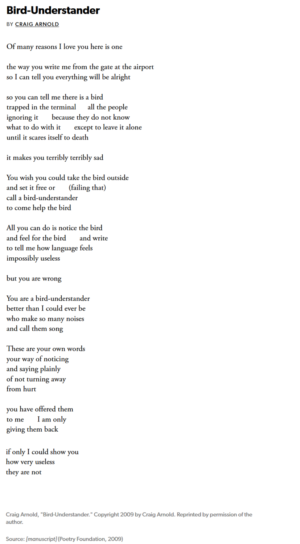
And y’all did keep the staff together and we are moving forward stronger. What is something that surprised you as managing editor?
Well, I think [that] COVID was surprising and the changes that came out of that, were on a logistical level, very surprising. This wasn’t necessarily surprising, but it was really interesting that I think being on a leadership team can be a really interesting experience, for something like the Review where you’re constantly needing to discuss things and make decisions. I mean it’s a college newspaper. It’s not The New York Times, but the decisions have implications, and will have an impact on content or staffing and stuff. There were things that we pushed for during COVID that if we hadn’t, I think it would have been a way more trashed year, like on an administrative level with making sure we could be able to do certain things like employing juniors, for example. I think I’m surprised by the extent to which you can get things that you push for.
Persistence.
Yes, and the extent to which you don’t have to take no for an answer, so that was surprising in a fun way. And I think also just the experience of being on a leadership team, like I was saying is very difficult, but very invigorating. We’d change each other’s minds in discussion and then be fighting from opposite sides or whatever. Or we’ll need to spend so much time on the details of a certain thing. I think the extent to which dialoguing with people gets you somewhere really productive is continuously interesting to me, having been managing editor and working with the Review. And I think there’s an extent to which the managing editor role is supposed to be the voice of reason, supposed to be like, “Okay, this is the time that things need to happen,” and that role is interesting to play within a group of three people. But when we’re making situational decisions we were mostly just three people and the job titles are not as important. Those discussions are really cool to be a part of. It really empowers you to take that responsibility seriously and also feel emboldened behind your decisions. Just saying it with your chest and being, “This is what I think we should do.” And if you really think something different, this is what I think the compromise could be.
Is there anything else you would like to add?
Just Katherine and Anisa have been awesome EICs to work with. So lovely and so dedicated. Speaking of inspiring, very continuously inspired by them, and by everybody who works for the Review and yeah, again, I’m so excited to watch it all happen. I feel really fortunate to have met so many cool people, people through the paper and then mentored by cool people and have the chance to do that for other people. I just feel very fortunate to have this little group.


